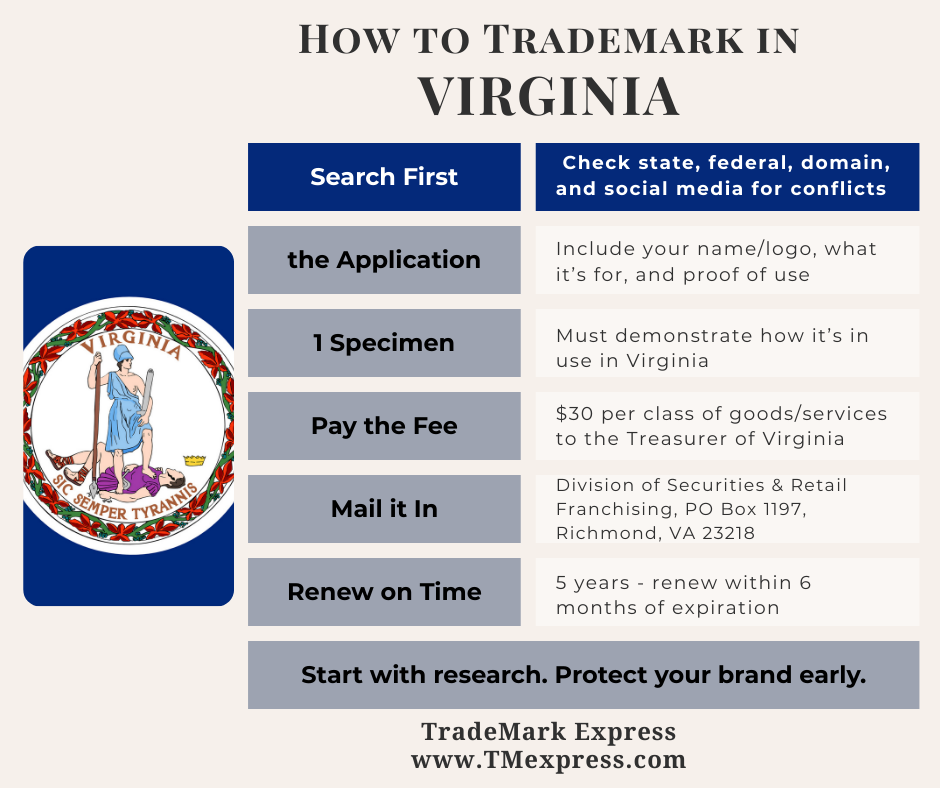How to Trademark in Virginia
When you picture Virginia, you might think of rolling Blue Ridge Mountains, historic cobblestone streets, or the iconic Chesapeake Bay. Much like its deep history and enduring landmarks, your brand deserves to stand strong and protected for years to come. And since this post is publishing just after National Virginia Day (September 14), it’s the perfect moment to shine a spotlight on how business owners in the Old Dominion can protect their brands with trademarks.
Whether you’re launching a craft brewery in Richmond, a boutique in Charlottesville, or a tech startup in Northern Virginia, your business name and logo are valuable assets. Trademarks ensure that those brand elements are safeguarded. And here’s the key: you have two main options — state-level protection in Virginia or federal protection through the USPTO. Which path you take depends on your business goals.
What Makes Virginia Unique for Business Owners
Virginia’s business environment is a unique blend of history and innovation. As home to the first permanent English settlement in Jamestown and now to one of the fastest-growing tech corridors in the U.S., the state offers both tradition and forward momentum.

Key industries include defense contracting, agriculture, information technology, and wine production — Virginia is one of the top wine regions on the East Coast. With such diversity, brand identity plays an important role. A winery named after Shenandoah, or a tech firm with “757” in its brand (a nod to the Tidewater area’s area code), is deeply tied to local culture.
That’s why protecting your trademark is crucial. Your business name isn’t just a label; it’s the story you’re telling your customers.
Should You File a State Trademark or a Federal Trademark?
Not sure which type of protection is right for you?
Here’s a simple checklist to help you think it through:

✅ You only plan to do business within Virginia.
✅ Your business name or logo is highly local (e.g., includes a city, region, or Virginia-specific reference).
✅ You want faster, more affordable trademark protection.
✅ You’re not ready to file at the federal level yet.
✅ You’re planning to grow but need an interim layer of brand protection.
If a few of these points sound like your situation, a Virginia state trademark could be a good fit. But no matter which route you choose, a comprehensive trademark search is essential first. This step ensures your brand name isn’t already in use — protecting you from costly conflicts later.
How to Register a Trademark in Virginia
Filing a state trademark in Virginia is a fairly straightforward process, but there are some unique requirements to know about.

2. Notarization
The application must be signed before a notary public. This extra step distinguishes Virginia’s process from some other states.
3. Filing Fee
The non-refundable registration fee is $30.00 per class. For example, if your mark applies to two classes, the total is $60. Payments should be made to the Treasurer of Virginia.
4. Duration of Protection
A Virginia trademark registration lasts five years.
5. Renewal
To renew, you must submit Form TM2 no earlier than six months before expiration. Importantly, you cannot renew a mark that has already expired. Renewal fees are the same as initial filings.
6. Where to File
Applications are sent to Division of Securities & Retail Franchising, PO Box 1197, Richmond, VA 23218. For assistance, you can call (804) 371-9051 or visit www.scc.virginia.gov/srf.
What About Federal Trademark Protection?
If your business operates beyond Virginia — or if you sell products or services online across state lines — federal trademark protection through the U.S. Patent and Trademark Office (USPTO) is usually the better option.

Federal trademark registration provides:
- Nationwide protection
- Legal presumptions of ownership
- The ability to use ® next to your mark
- Stronger enforcement rights
The federal process takes longer and costs more than a state filing, but it’s often worth it for growing or digitally focused businesses. Again, comprehensive trademark research is a must before pursuing federal protection.
Trademark Search Recommendation for Virginia Businesses
When choosing a trademark search provider for your Virginia trademark, look for one that goes beyond the basics. The Virginia Secretary of State’s database is a starting point, but it only shows marks registered at the state level. If you’re seeking a Virginia state trademark, that database matters — but it won’t uncover potential conflicts outside the state.

A strong trademark clearance search should also include:
- Federal trademark USPTO records – to catch marks that could block your use if you expand beyond Virginia.
- Other state trademark databases – even if you only plan to file in Virginia, nearby states like Maryland, North Carolina, and Tennessee may already have businesses using a similar name. Because customers often cross borders — and brands increasingly operate regionally or online — these conflicts can still create problems for your Virginia brand.
- Common law use – looking for unregistered names and logos in real-world use, including similarities in sound, appearance, or meaning, as well as overlapping goods or services.
- Domain names and social media handles – to ensure your brand isn’t already active online.
By choosing a provider that covers all these areas, you’ll gain a clear picture of where your brand stands. This wider net helps reduce the risk of conflicts before you invest in filing — whether at the state or federal level.
Conclusion
Just like Virginia’s motto — Sic Semper Tyrannis (“Thus Always to Tyrants”) — your business deserves to stand strong against anything that threatens it, including brand confusion. Filing for a trademark early is one of the best ways to protect your identity, your reputation, and your growth potential.
Not sure which type of trademark is right for your business in Virginia? TradeMark Express can help you research and prep before you file — saving you time, money, and future headaches.
